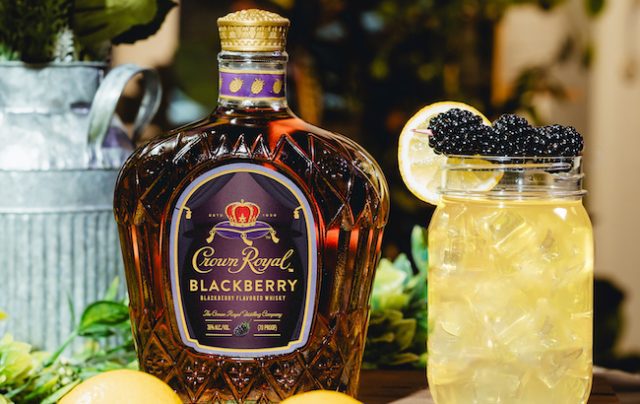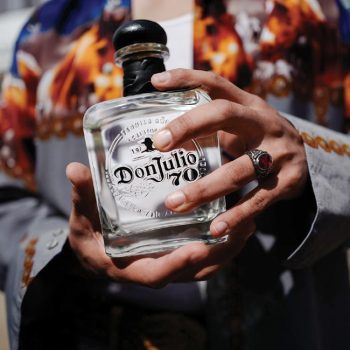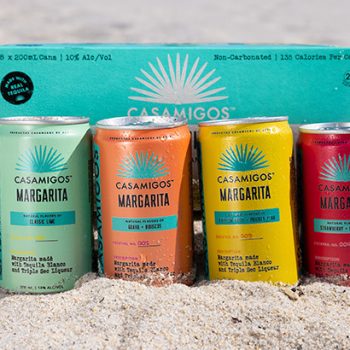Full-year 2025 sales up for Diageo despite ‘challenging year’
By Georgie CollinsJohnnie Walker owner Diageo has reported net sales growth of 1.7% for the year ending 30 June 2025 despite a decline in the fourth quarter, with standout performances from Don Julio and Crown Royal.

Delivering in line with the company’s guidance and amid a ‘challenging market backdrop’, the London-headquartered firm delivered 1.7% organic sales growth in its preliminary full-year 2025 (F25) results, lowered to 1.5% to account for the impact of the Cîroc transaction in North America.
However, organic profit declined by 0.7%, including the Cîroc transaction impact, or by 1% excluding it.
In the preliminary results report published this morning (5 August), Nik Jhangiani, interim CEO, commented: “While we are encouraged by areas of progress and the standout performance from Don Julio, Guinness and Crown Royal Blackberry, there is clearly much more to do across our broader portfolio and brands. We recognise the need to drive meaningful growth opportunities in an evolving TBA [total beverage alcohol] landscape, and we are sharpening our strategy to accelerate growth.”
He added: “While macroeconomic uncertainty and the resulting pressure on consumers continues to weigh on the spirits sector, we believe in the attractive longterm fundamentals of our industry and in our ability to continue to outperform as the TBA landscape evolves. We are focused on what we can manage and control and executing at pace. The board and management are committed to delivering improved financial performance and stronger shareholder returns on a sustained basis.”
Regional performance
Positive organic sales growth was seen in many regions, with US spirits net sales up by 1.6%, led by 16.9% growth from the firm’s Tequila portfolio, driven by Don Julio – particularly Don Julio reposado. The brand’s net sales grew by 41.9%, pushed by its cultural relevance and successful activation.
Meanwhile, Casamigos’ net sales declined by 18% as a result of increased category competition driving lower demand.
Crown Royal whisky was the only other brand to see net sales growth in the US, rising by 3.8%. The growth was primarily driven by continued strong consumer demand for Crown Royal Blackberry, launched in the second half of fiscal 2024.

It was less positive for the Buchanan, Johnnie Walker and Bulleit Whiskey brands, sales of which declined by 26%, 10.6%, and 7.3% respectively.
Category weakness was blamed for Johnnie Walker’s sales drop in the region, while increased competition in the American whiskey category was the reasoning offered for Bulleit’s sales drop.
On a media call hosted this morning by Jhangiani, it was noted that while Diageo is pleased with its F25 performance in the US: “We are clear we need to focus on driving more balanced growth in the coming years, given the ongoing economic pressure on the US consumer and that we are lapping a period of strong share growth. As such, we have planned for a more cautious consumer environment in this coming year.”
Meanwhile in Europe, net sales grew by 0.4%, broadly in line with organic net sales, which increased by 0.3%.
Great Britain witnessed a net sales growth of 3.5%, aided by the performance of Guinness. Meanwhile it was the company’s focus on Tequila that drove strong growth, with Casamigos as the main driver.
The firm noted that Casamigos has seen “great off-trade success” and remains the fastest share-gaining super-premium Tequila brand in the off-trade, ahead of Patrón, according to FYTD Nielsen data to the week ending 14 June 2025.
Johnnie Walker, Gordon’s and Baileys delivered strong double-digit volume and organic net sales growth in Türkiye, which led to a net sales growth of 20.9% in the country, while Ireland’s net sales growth of 5.5% was driven by the continued success of Guinness.
Elsewhere in Europe, sales declined – by 6% in southern Europe, 13.9% in northern Europe, and by 0.4% in the rest of the region.
Southern Europe’s decline was attributed to the company’s performance in France, which was adversely impacted by the transition to a new distribution model for its malts and luxury brands from its joint venture with Moët Hennessy. The firm moved to direct distribution by Diageo France in March 2024, with the remaining brands moved in January 2025.
However, despite category challenges in the wider market, the firm’s market share of spirits grew, led by Johnnie Walker and Don Julio and supported by strong activation.
Meanwhile in northern Europe, strategic Scotch pricing in Germany negatively impacted the company’s performance.
Net sales in Asia Pacific fell by 4.8%, due to an organic net sales decline, the disposal of Windsor, and unfavourable foreign exchange.
Organic net sales declined by 3.2%, due to continued macroeconomic challenges, notably in China, which saw sales fall by 9%, and Southeast Asia, where sales declined by 7%.
Category pressure in travel retail Asia led to a net sales fall of 24.3%, with softer consumption and continued retail inventory destocking. Despite this, the business gained share, driven by the Johnnie Walker portfolio and Don Julio.
These declines were partially offset by India, where performance was strong with an increase of 7.1%, driven by strong growth in the Prestige & Above segment. Double-digit growth for Black & White, Signature and Royal Challenge stood out along with positive growth for McDowell’s.
In Latin America, organic net sales grew by 9.2%, with volume up by 3.2%.
Brazil’s net sales grew by 18%, driven by volume growth, reflecting premiumisation and strategic pricing actions, supported by a more stable consumer environment and targeted investment.
Growth was led by Scotch, particularly Johnnie Walker and Old Parr, but notably, Brazil has become a key strategic market for the ready-to-drink (RTD) segment, with Smirnoff driving strong growth through targeted investment and strong in-market execution.
Mexico’s net sales grew by 5.4%, as the consumer environment began to stabilise over the year, though momentum remained subdued. Growth here was largely driven by Don Julio. This was partially offset by a decline in whisky, mainly Buchanan’s.
However, Buchanan’s aided the net sales growth of 21.5% in Colombia and Venezuela.
Reported net sales in Africa grew by 3.1%, with strong organic net sales growth of 10.5%. This growth was seen across all markets, most notably, double-digit growth in Ghana, South Africa and Tanzania.
Category and brand performance
Across all spirits, Tequila was this year’s standout category for the firm, growing by 15% in volume and by 18% in organic net sales – but with markedly different performances from its two Tequila brands. Don Julio led the charge, with an increase of 41% in volume and 28% in organic net sales. Meanwhile, Casamigos, which accounts for both Tequila and mezcal variants, took the biggest volume and organic net sales tumble, falling by 16% in both.

The firm has confirmed that its strategy to improve the brand’s performance this fiscal year has included a new campaign and launching the Casamigos Margarita RTD. Although early days, the company said it was encouraged by the take up and feedback from both retailers and consumers to date, and will be leveraging the brand’s role in the FIFA World Cup partnership in the coming year to continue this growth.
Crown Royal saw volume sales rise by 4%, and both organic and reported net sales increased by 3%, while Johnnie Walker saw falls across the board, with volume down by 3%, and organic and reported net sales down by 5% and 7% respectively.
Jhangiani noted that the firm was “making progress addressing the continuing trend and growth opportunity of moderation by ensuring that we provide a range of choices to consumers. In fiscal 25, we saw significant growth in our offerings here – we are the number-one non-alc ‘spirits’ brand owner globally, over four times the size of the nearest number two.”
He added: “Our broad portfolio offers a great range of quality non-alc alternatives across occasions and markets. This year we also added to this with the purchase of Ritual Zero Proof, the number one non-alc ‘spirits’ brand in the US.
“We are focused on being consumer- and occasion-led as we think about our portfolio and format offering. Many of those occasions are increasingly in non-traditional locations – such as sports games, festivals or concerts, where RTDs for instance provide a convenient serve format – in pre-measured serve and often at a lower ABV.
“While Diageo’s strategy with RTDs has been less consistent over recent years, in fiscal 25 we proactively changed this approach to be more focused and targeted on growth markets and brands.
“Within this segment, we saw 2% organic net sales growth and we can do much more. We are moving at pace and with a cross functional team to improve commercial execution and visibility, and to innovate on liquid and across pack formats with a more FMCG (fast moving consumer goods) mindset.”
Fiscal 26 outlook
Looking ahead to the 2026 financial year, Jhangiani noted: “I continue to see a challenging consumer environment.
“For the full year, we expect similar rates of organic net sales growth to those that we have seen in fiscal 25. We’re also mindful that some factors will impact phasing of growth through fiscal 26. Two key regions I would highlight here are Asia Pacific – where we will have a relatively late Chinese New Year in 2026, and also North America, where we are lapping the increase of Don Julio inventories as we highlighted through fiscal 25. As such, for the first half of fiscal 26, we expect organic net sales growth to be slightly negative, with growth skewed to the second half.
“We expect to deliver positive operating profit leverage as we set out before, boosted by our savings from our Accelerate programme. For fiscal 26, we expect mid-single-digit organic operating profit growth. This also includes the impact of US tariffs based on what we know today.”
He concluded: “While I am encouraged by our areas of progress, there is clearly much more to do, and I am excited by the potential opportunities as we sharpen our strategy to ensure Diageo is on the front foot again. We remain focused on driving sustainable growth ahead of the market, in an evolving TBA landscape, including addressing the role of moderation.
“We will fully leverage our incredible portfolio and the competitive strengths of our business.”
